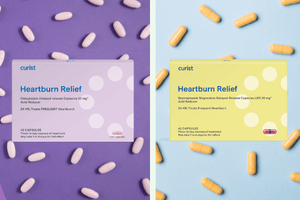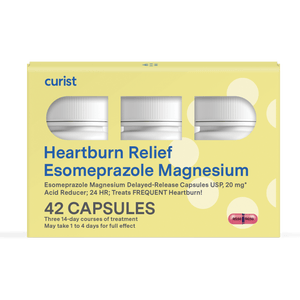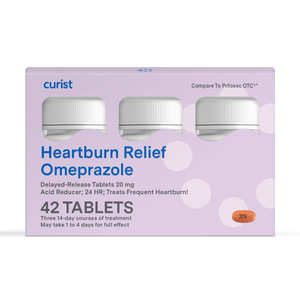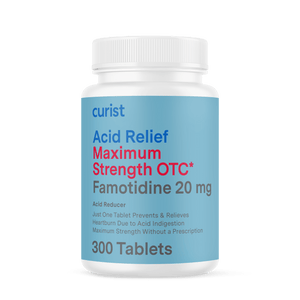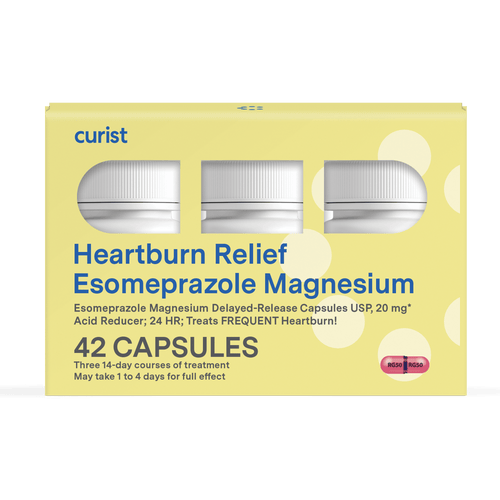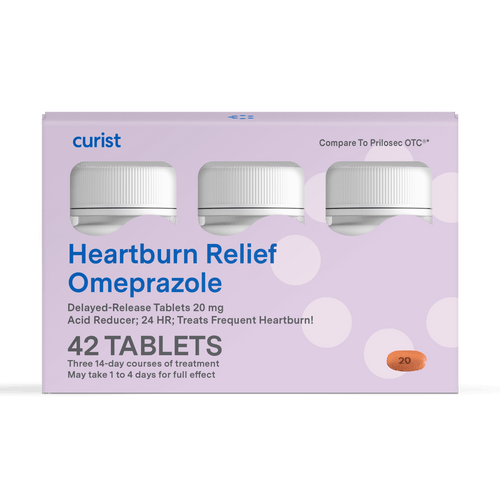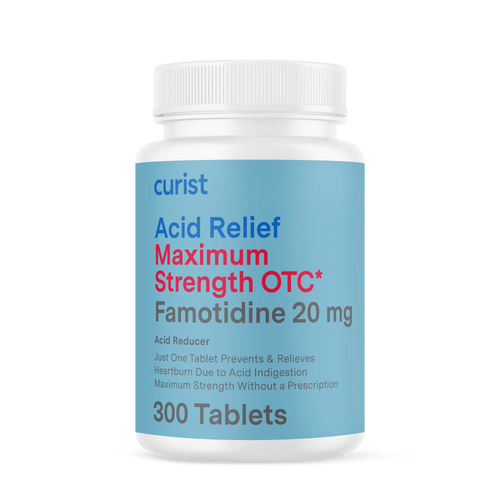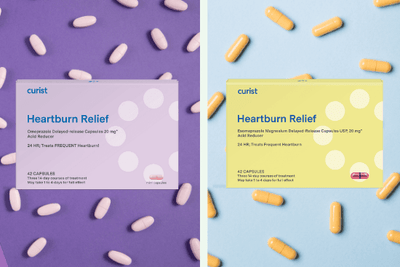Curist delivers over-the-counter medicines to your door at a fraction of the price of traditional brands. We hope everyone stays safe and healthy during this time.
What Causes Heartburn at Night?
Heartburn occurs as a result of food and stomach acid backing up into the food pipe, or esophagus. Typically, as you swallow food, it passes through the esophagus and into the stomach through a band of muscle called the lower esophageal sphincter (LES). This sphincter acts as a valve to the stomach, keeping food from moving back into the esophagus. Sometimes, the valve may fail to close completely, allowing food and stomach acid to leak from the stomach into the esophagus, causing a burning sensation called heartburn.
Why Do I Have More Acid Reflux at Night and Keep Getting Heartburn At Night?
You may experience more acid reflux at night than during the day. The reason for this is gravity. When you sit or stand, gravity helps move the food through your esophagus and into the stomach. When you are laying down, you lose the effect of gravity on the food traveling through your digestive system. In other words, laying down can push acid from the stomach up into the lower esophagus, making it harder for food to properly digest. Because of this, many people find their heartburn to be worse at night.
Can I Choke in My Sleep from Acid Reflux?
Gastroesophageal reflux disease (GERD) is a condition marked by repeated episodes of acid reflux that can affect your quality of life. Most patients with GERD experience an increase in severity of heartburn symptoms while sleeping or attempting to sleep. Beyond just heartburn, if the stomach acid backs up into the esophagus and far enough to reach the throat and larynx, you may wake up coughing and choking at night.
Can I Die from Acid Reflux in My Sleep?
Acid Reflux every now and then is not a cause for concern, however, if it is becoming more frequent (episodes occurring 2 or more times a week), it is a sign of GERD and you should check in with your doctor. According to the American Cancer Society, patients with GERD have a slightly increased risk of permanent damage to the esophagus and can also lead to a condition called Barrett’s esophagus which can increase your risk for developing esophageal cancer. In short, you are not going to die from acid reflux in your sleep. However, if acid reflux occurs frequently and is left untreated, it can lead to higher likelihood of developing serious or life threatening complications such as esophagitis, ulcers, aspiration pneumonia, and Barrett’s esophagus.
Thankfully, you can act now. There are many ways to treat and prevent acid reflux, such as you can try to pinpoint your reflux triggers (e.g. smoking, fatty or fried foods, alcohol, coffee) and avoid them as much as possible. You can also try to avoid eating meals late at night (laying down after eating makes it easier for stomach acid to travel upwards). If symptoms continue to persist, you may turn to over-the-counter medications that neutralize stomach acid (e.g. Tums®), decrease stomach acid production (e.g. Pepcid®), or heal the esophagus (e.g. omeprazole, esomeprazole).
Because many people find GERD to be worse around bedtime, focusing on how to sleep with GERD may help reduce symptoms and improve sleep. Continue reading to learn more!
How to Treat Heartburn at Night? 3 Tips To Prevent Nighttime Heartburn Without Medicine
If you are experiencing heartburn symptoms at night, there are several home remedies and lifestyle adjustments that you can try to help provide relief.
Tip 1 for Nighttime Heartburn Relief: Elevate Head and Chest
For people who sleep on their back, heartburn symptoms may occur if stomach acid leaks from the stomach back into the esophagus as they lay down. In these cases, one can try to reduce their symptoms by using gravity and elevating the head and chest higher than the lower abdomen.
Using specifically designed wedge pillows is one way to keep the upper body more upright during the night. Alternatively, you can try raising the upper half of the bed slightly by safely placing cinder blocks, bricks, or wood beams under the head of the bed.
Tip 2: Best Sleeping Position for Nighttime Heartburn Relief: Sleep on the Left Side
Some people notice their symptoms get better when they sleep on their left side. Laying on your left side allows acids to pass through the lower esophageal sphincter into the stomach and thus making it less likely for stomach acid to back up into the esophagus.
Tip 3 for Nighttime Heartburn Relief: Avoid Tight Clothing
Wearing tight, restrictive clothing can put pressure on the abdomen and is more likely to cause heartburn symptoms. You may find it beneficial to wear loose fitting pajamas to bed rather than restrictive clothing, such as bras, compression shirts, or items with tight waistbands.
Best Self-Treatment Medicine Options for Nighttime Heartburn Relief
If occasional heartburn symptoms persist, some people turn to medicines designed specifically for treating acid reflux. These medicines can be very effective self-treatment options. There are 3 classes of over-the-counter medications indicated for treatment of heartburn.
- Antacids (Eg. Tums®, Milk of Magnesia®): Used to treat mild, infrequent heartburn; It has a fast onset (within 30 minutes) but shorter duration (lasts for 60 minutes).
- Histamine-2 Receptor Blockers (Eg. Pepcid®) - Used to treat mild, infrequent heartburn; It has a slower onset than antacids (within 90 minutes) but a longer duration (lasts for 540 minutes). H2 blockers help to control acid all night and can also be used with antacids to prolong heartburn relief. Most importantly, this class of medications can be used to prevent heartburn (especially when one can anticipate an event of heartburn).
- Proton Pump Inhibitors (Eg. Omeprazole, available at Curist hereto learn more; Esomeprazole, available at Curist here) - Unlike antacids and H2 blockers which are designed to treat infrequent heartburn, PPIs treat frequent heartburn (occurs 2 or more days per week). Typically, PPIs are used daily and take 1-4 days for full effect and therefore are not intended for immediate relief of heartburn. This class of OTC medications are only intended for a 14-day course of treatment and can be used up to three times per year (every four months) as needed. To learn more about these medicines, please check out Curist’s articles:
When Should I See a Doctor About Nighttime Acid Reflux?
Occasional heartburn is common and can often be self-treated with OTC medications and lifestyle changes. If your nighttime heartburn symptoms worsen, or occur 2 or more times a week, it may be a sign of gastroesophageal reflux disease (GERD). While GERD is not life threatening, you should consult your doctor if symptoms persist for more than a couple weeks.
If you want to learn more about how to prevent heartburn and various self-treatment relief options, check out Curist’s other articles about heartburn:

